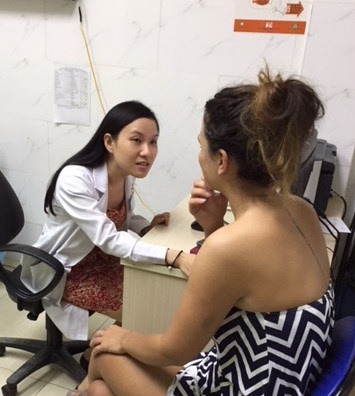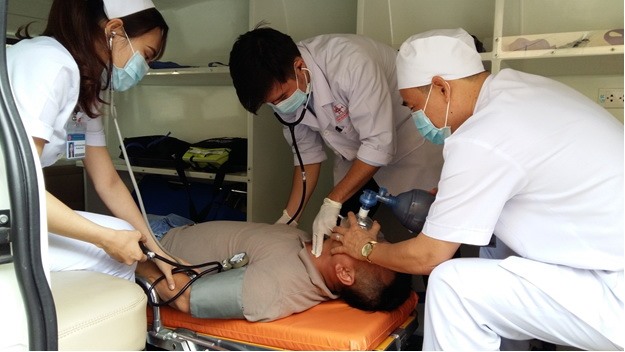 Society
Society

Guzman Rober, a 40-year-old American tourist on a recent visit to HCM City, began having an unremitting epileptic seizure at a hotel on Đề Thám Street in HCM City’s District 1 when a housekeeper luckily found him in time and called the reception desk for help.
 |
| A foreign patient is examined at Sài Gòn General Hospital in downtown HCM City. The medical services room for foreigners at the hospital receives more than 100 foreign out-patients from more than 30 countries and territories every month. — Photo courtesy of Sài Gòn General Hospital |
San Hà
HCM CITY — Guzman Rober, a 40-year-old American tourist on a recent visit to HCM City, began having an unremitting epileptic seizure at a hotel on Đề Thám Street in HCM City’s District 1 when a housekeeper luckily found him in time and called the reception desk for help.
Six minutes after the call, the emergency crew at Sài Gòn General Hospital in downtown HCM City arrived at the scene and provided immediate medical help to manage the man’s crisis.
Rober was then transferred to the hospital for continued care.
An unremitting seizure can be life-threatening and requires prompt emergency intervention, according to Trần Điền Tú, a doctor with the emergency crew.
When the ambulance was en route to the scene, constant communication and updates were being transmitted to the crew so they could provide essential treatment once they arrived.
Another foreign tourist, Joseph Broddly Lloyd, 40, of the UK suffered from acute alcohol poisoning after drinking a lot for three days in a row.
His friend called 115 for emergency medical help after Lloyd showed symptoms of confusion, vomiting, choking and a high fever. Lloyd was later diagnosed with alcoholism and a respiratory infection.
These are only a few of the hundreds of cases that the emergency team handles each month.
On the occasion of festivals and national holidays, the number of emergency calls usually peak in the middle of the night due to the rising number of traffic accidents, drinking and fights.
The most common illnesses among tourists are digestive disorders, food poisoning, stroke, asthma, traffic injuries, diabetes and alcohol addiction, according to Tú.
Most foreign patients are tourists staying in hotels and apartments in HCM City’s District 1, he said.
Located downtown opposite Bến Thành Market, Sài Gòn General Hospital’s 115 satellite emergency station provides treatment for local residents as well as foreign tourists, Nguyễn Khắc Vui, deputy director of the hospital, said.
Two emergency ambulances with appropriate equipment and supplies to optimise pre-hospital delivery of care are on standby 24 hours a day.
Two crew with a total of seven doctors and 10 support nurses continually update their skills in emergency first response, while doctors are also proficient in communicating in English with foreign patients.
Established in August last year, the station usually provides three to five emergency treatments for foreign tourists a day, he said.
“The station will respond to emergency calls, send the ambulance and medical staff to the scene for immediate medical help, and transfer the patient to the hospital,” he said.
Patients are treated at the hospital or referred to major hospitals such as Chợ Rẫy Hospital, HCM City Medical University Hospital and FV Hospital in case of serious illness.
 |
| Doctors and nurses provide medical emergency treatment for a patient. — Photo benhviendakhoasaigon.vn |
Sài Gòn General Hospital is located in the heart of the city in District 1, where most tourists stay.
The city’s health department plans to continue to help the hospital improve its emergency station for locals and foreigners, Tăng Chí Thượng, deputy director of the department, said.
“The number of foreign tourists and expatriates working in the city has increased rapidly, requiring the development of medical facilities and emergency services in the city’s centre,” he said.
The city is also focusing on improving tourism service quality and expansion of tourism events, destinations and products.
Last year, the city kicked off a pilot programme jointly implemented by the municipal departments of Health and Tourism that will develop a medical tourism network that meets international standards.
Emergency medical services for tourists are part of the city’s medical tourism programme, he said.
The health department has also sent doctors who work at the 115 satellite emergency stations to Australia for paramedic training.
Positive feedback
Foreigners who have received treatment in recent months have had positive comments about the services.
Johan Louedec, 24, from France, who lives in a rented apartment downtown and works as a lecturer for an international school in HCM City sought treatment at a hospital six days after burning his skin with very hot coffee.
The doctor cleaned and bandaged the burn area, and prescribed oral antibiotics for the infection, he said.
“The hospital was the nearest hospital from my apartment on Trần Hưng Đạo Street in District 1,” he said. “My roommate visited the hospital once after he cut himself with a knife while cooking.”
“The service was very good and pretty fast. I think it took about 12 hours, but everything was done in an hour,” he said.
Medical services for foreigners at the hospital receive more than 100 foreign outpatients from more than 30 countries and territories every month, the hospital’s deputy director, Vui said.
To meet the increasing number of foreign patients, the hospital will set up an international medical unit soon to provide treatment for in-patients. — VNS




